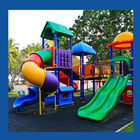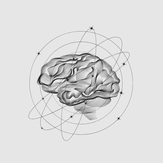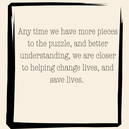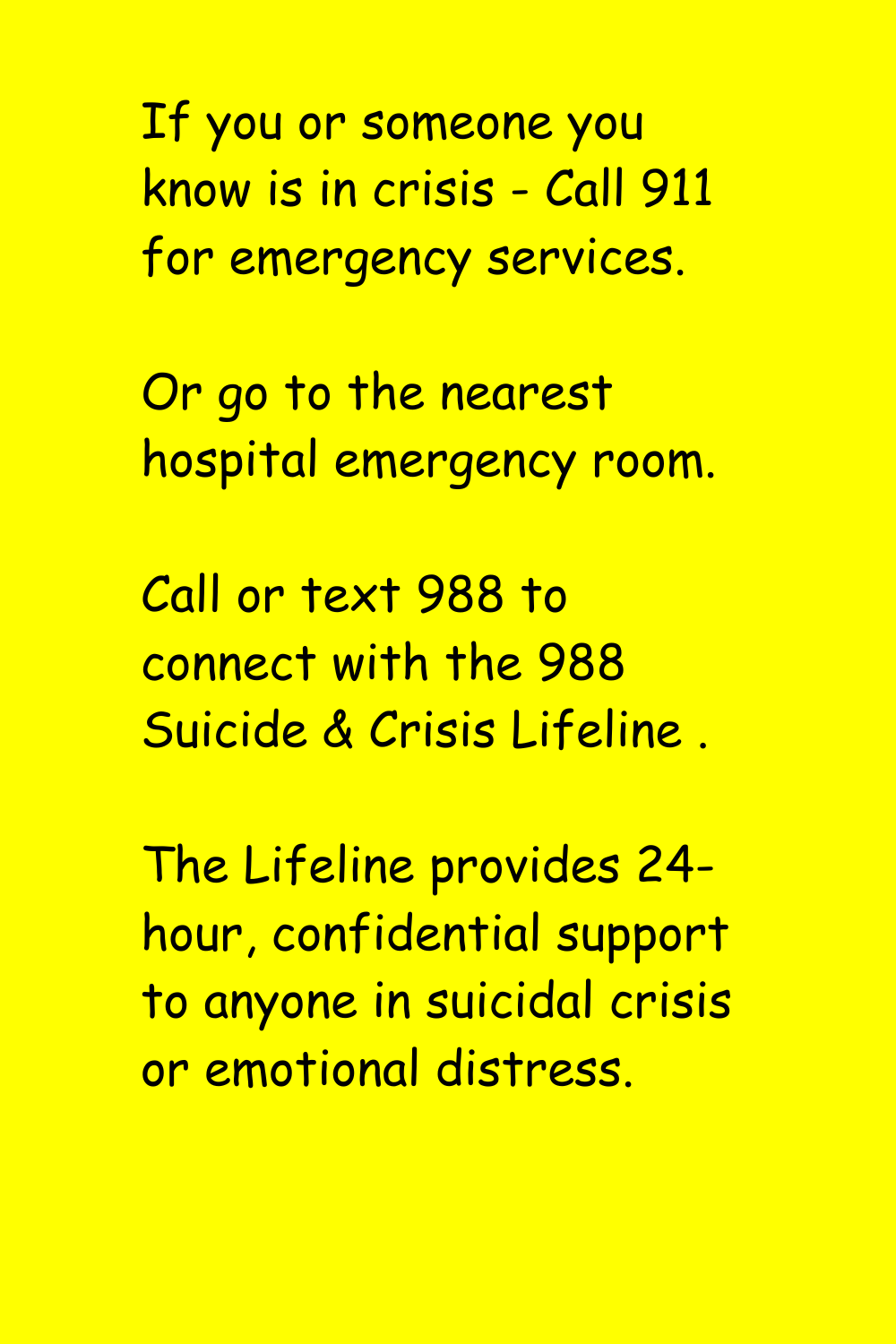 The Toolbox Series is designed to be a quick take-and-use tip, and you can find those in four places currently. Facebook, Instagram, Pinterest and YouTube. Each one is a video and has the same background as the picture on this post. The concept is we know that people are spending a lot of time on social media, and a lot of the messages they are seeing are just not positive. These videos are designed to provide both an interrupt and a positive thing a person can do in the moment, and add to their skills to use another day. Especially when we know that people are often coming to social media to "checkout" or avoid feeling, anxious or overwhelmed as examples. And in today's society where we continue to consume content in mere seconds, it's good to have easily consumable take and use tools. What I have found is people need a lot more than "call or text 988" because they are not necessarily in crisis. But they are in a place of not knowing how to shift to a more positive outlook or solution. Plus being overwhelmed by a lot of do this and this and this and that -- less helpful too. Instead a quick reminder, a take and use, or be able to revisit. I think being able to revisit is great because you can know there is a place you can go find a quick answer when you need it, and or to share with a friend, family member, or loved one when they need it. You can also just take it and hit share when you are feeling like the overall vibe in your circle of influence can use another positive tool reminder.
0 Comments
 NEWS MENTAL HEALTH FAMILIES This is a good article that looks at parents' fear on each side of the story - what could happen, what did happen. Mental Illness affects more than the person. "“But it also, in a weird way, I guess it has energized both my wife and I to advocate and to try to do what we can. But it really is like pushing that proverbial boulder up a hill. You get it up the hill and then it rolls back down again.”This uphill battle with the mental health care system in Oregon eventually escalated to the criminal justice system. Even while Alexa was still delusional at a mental health facility, Dan said she was released against his wishes. Soon after, these strangers stories collided. “Within 3 weeks to a month, she was arrested in a park because she had entered into another delusion where she thought she needed to protect a young child and she took the child by the hand and walked her a certain distance and she got arrested for kidnapping,” he told KOIN 6 News. “And I think there’s a causal connection between the premature discharge at this facility and her getting arrested.”" See the full article here: https://www.koin.com/news/oregon/kidnapping-connects-2-dads-exposes-untreated-mental-illness-in-oregon/
 Making sure we drink enough water each day is important for our whole body and health. And is a great example that it's really all health in our bodies. When we don't have the hydration that we need we can see it change many things in our bodies from our brain to our organs, our joints, and even in how well we can control our body temperature. You may have heard not having enough water can give you a headache (true), and look at your urine color to see how hydrated you are (clear is good, dark is bad) but there is a lot more happening in your body and your brain. So let's look at some of the things that water helps make happen in your body, and then the levels of mild to moderate dehydration, and serious to chronic too. Water helps your body to move nutrition through you, and waste out of you. It helps keep your blood pressure level, and not enough of it can even make you feel light-headed. And are you tired? Have a glass of water, and move around a little, because it could just be that you are dehydrated. The cells in the body, including our brain cells, depend on this water to carry out essential functions. That means you can feel your joints are more achy just from being dehydrated. It's also needed for the production of hormones and neurotransmitters in the brain, and that includes how your memory is, and how clearly you can think, and yes even your mood. And that can even show cognitive decline. A specific that we see in the elderly, and those with memory care issues. Many times a person who is struggling with incontinence will purposely choose to not drink liquids because they don't want to have an accident. Or they may not remember they haven't had anything to drink, or have the ability to know that their mouth is dry, or that what they are feeling is thirst. Often something else happens, maybe they have a fall, heart palpitations, or decreased function and they end up in the hospital for an evaluation and on fluids. The family is then surprised to see what a change there is in their recognition, color, and memory. This is an easy explanation to see and to understand, but it's important to remember that is also true about people in general, people of all ages. Even mild dehydration can lead to a headache, because when you're dehydrated, your brain and other tissues in your body shrink, or "de-plump". As your brain shrinks, it pulls away from the skull, puts pressure on nerves, and causes pain. Same concept for your joints. Without enough water, your brain can't get enough of the amino acid tryptophan needed to create serotonin, also known as the "feel good" chemical. That's a big problem because serotonin is the neurotransmitter that regulates mood. Imagine being able to feel a little less grumpy or better, just because you stay hydrated. We KNOW drinking water is a habit we need to develop and actually do. But some people need another way to get more fluids in (especially the elderly in the example above) and the great news is there are other ways to hydrate too. But not instead of, but in combination with drinking water. There are a lot of foods that have a high water content like watermelon, honeydew, cucumbers, strawberries, celery, citrus fruits and more. And there are also foods we can make like soups, stew, or broth that is hydrating. And of course, we can add flavors to water to change the taste, like teas, or hydration packets. I like to take a cucumber and slice it up, put it in a pitcher of water, let it soak, and drink the water. Delicious! Other options are lemons, oranges, and other fruits, some people even love to add radishes. What about coffee? Great news for you coffee drinkers, because very recently it has been debunked, that it doesn't count. And here is a link to a study that you can read, and show your friends and family that tell you no! https://journals.plos.org/plosone/article?id=10.1371/journal.pone.0084154 This is not a free pass, that it's your only intake. There is still too much of what it is the coffee that affects things like your blood pressure. So what are some of the warning signs of dehydration? Some mild dehydration signs include: And if you are experiencing these, stop what you are doing, have a glass of water, and cool down, and then re-evaluate.
Moderate to serious dehydration If you are experiencing any of these you will probably need an intervention like an IV and a medical evaluation.
Here you will need intervention that includes not only an IV but can also include things like short-term dialysis, and a battery of testing to see what other body functions are no longer in alignment, and also in need of care
Now these are not complete lists and if you have any concerns or questions about dehydration, please seek a medical opinion. And if you are a care provider, for a family member and you see a change in behavior, consider hydration. Next? Go have a glass of water!  NEWS ARTICLE RESEARCH GENETICS SUICIDE "The takeaway is that the genetic variations, when combined with other stressors, could heighten the risk." Interesting study, that shows some links to the decisions being connected to more than one thing, and that could help us learn who is at most risk, so we can make sure they have a better opportunity to not just intervention but solutions.
You can see the article about the study here: https://www.foxnews.com/health/suicide-genetics-study-identifies-12-dna-variations-could-increase-risk Drinking enough water each day helps regulate body temperature, keep joints lubricated, and also to prevent infections.
Thanks for being here for the animated series. Created in Canva using HeyGen AI and Playground. Water helps your brain cells communicate with each other, and clears out toxins and waste that impair brain function. It also carries nutrients to your brain to keep your brain healthy.
Thanks for being here for the animated series. Created in Canva using HeyGen AI and Playground.  NEWS ARTICLE RESEARCH BRAIN CELLS "Researchers map gene switches and brain cell types associated with schizophrenia, bipolar disorder, Alzheimer’s disease, and major depression." "Every cell in a human brain contains the same sequence of DNA, but different cell types use different genes and in different amounts. This variation produces many different types of brain cells and contributes to the complexity of neural circuits. Learning how these cell types differ on a molecular level is critical to understanding how the brain works and developing new ways to treat neuropsychiatric illnesses." You can read the article at: https://scitechdaily.com/mapping-the-mind-decoding-neuropsychiatric-disorders-with-the-human-brain-cell-atlas/#google_vignette
And you will find at the bottom there is a lot of information on who, and references if you want to take a deeper dive into the information. 
I started a new series of videos this past Sunday on some of the social media channels. Where I am drawing one card from a self care deck and sharing that card with folks. Some of them are affirmations, some are tools and ideas you can take and use in your daily life, starting when you watch.
For transparency I want to show you the three decks I am currently using - and yes I will probably be adding more to the mix as we go. That way if one set is really resonating with you, you can go and get the deck for yourself for your own use or as a gift for someone.
these links are affiliate links to Amazon
 NEWS ARTICLE MESH Have you heard of the idea behind toys that are MESH - meaning mental, emotional and social health toys to help kids build resilience? You will be hearing a lot more about the concept by the middle of next year. This article has an early look at what that means, why and some of the pros and concerns. "The plan is to certify MESH toys by mid-2024 the same way the Toy Association did for STEAM toys, which emphasize science, tech, engineering, arts, and math. Adrienne Appell, a spokeswoman at the Toy Association, notes that MESH is an area it will continue to monitor as it evolves." See the article here: https://apnews.com/article/toys-emotional-health-7b1e6a821b48145836db9413cc3fbefa
 NEWS ARTICLE RESEARCH GENETIC STUDY Any time we have more pieces to the puzzle, and better understanding, we are closer to helping change lives, and save lives. If you are in crisis or considering self-harm call or text 988, 24/7 in the States "“Many people who die from suicide have significant health conditions associated with that risk,” says Anna Docherty, Ph.D., the study’s corresponding author and associate professor of psychiatry at Huntsman Mental Health Institute at the University of Utah. “If we can use genetic information to characterize the health risks of those who attempt suicide, we can better identify those patients who need contact with the mental health care system.” The research published online on October 1 in the American Journal of Psychiatry."
https://healthcare.utah.edu/press-releases/2023/10/largest-ever-genetic-study-of-suicide-finds-new-risk-factors |
Categories
All
|
